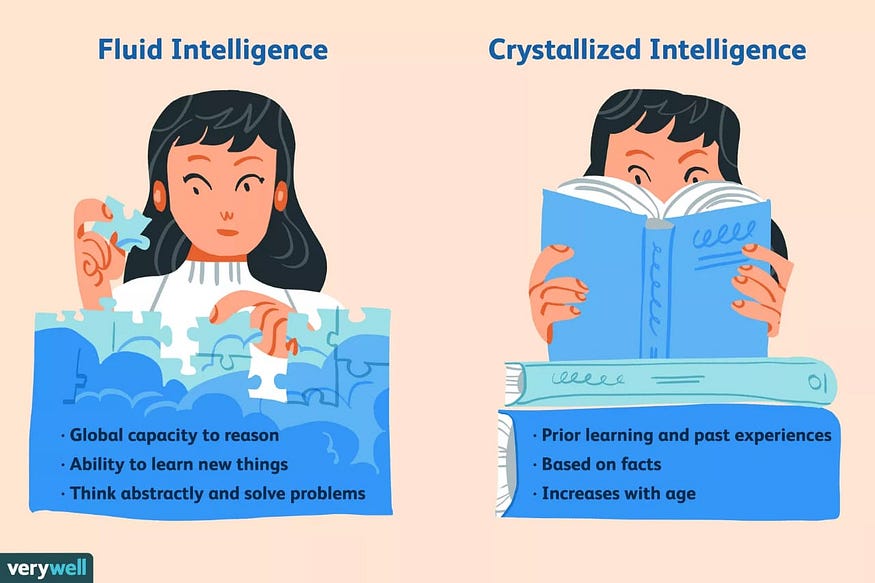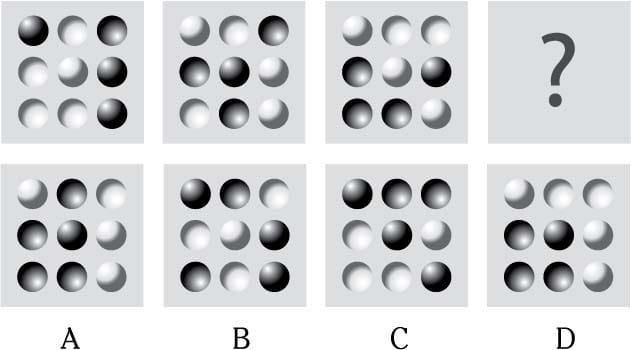Most cognitive ability tests measure general intelligence or ‘g’, which is an excellent predictor of cognitively complex performance. Many cognitive functions — for example, reasoning, comprehension, and creativity — are all wrapped up within the umbrella of general intelligence.
What is General Intelligence or “g”?
Psychologists call “g” fluid intelligence, or what you might call “learning power.” It’s about figuring out new, confusing situations, seeing beyond the obvious, coming up with fresh ideas, and tackling tough problems.
The other type, “crystallized intelligence,” is more about remembering things. Think of it as mastering and recalling specific knowledge, often learned in school.
Doing well in rote learning systems can boost your crystallized intelligence, but it doesn’t always guarantee strong fluid intelligence. And for complex jobs, fluid intelligence is the star player. It shines in situations with many sides and no clear answers, like most professional, managerial, and leadership roles.
Hence high scores in school or university are seldom indicative of career success.

While “g” is crucial, it alone won’t guarantee success in complex jobs. Lacking motivation, drive, or specific skills can still hold someone back. To understand “g’s” power, imagine a job spectrum. On one side, boring, repetitive tasks; on the other, constant challenges and newness. “G” shines in the second, where learning and adapting are crucial.
For easy, routine jobs, “g” matters less. But when things get messy and complex, “g” becomes a powerful predictor of success.

What Information Does a Test of General Intelligence Provide?
General intelligence (“g”) tests offer valuable insights into a candidate’s reasoning abilities. High scores indicate a strong mental capacity, evident in their trainability, adaptability, and problem-solving skills.
These individuals typically think clearly and excel at identifying complex business issues, even across functions or unfamiliar industries. Their strategic and visionary thinking is another key strength.
On the other hand, lower scores often reflect difficulty analyzing problems or comprehending complex information. This could stem from limited mental capacity or insufficient attention to detail.
Using Cognitive Ability Tests for Hiring Decisions

There is no better predictor of job performance than cognitive ability. Therefore, if you use just one assessment tool as part of your candidate screening process, make it a cognitive ability test.
However, cognitive ability tests are not a direct indicator of performance but rather a measure of capacity and potential.
A high score in a cognitive ability test generally predicts success in cognitively complex jobs.
However, lower scores should not necessarily doom a candidate. Experience and industry knowledge, for example, can make up for lower levels of cognitive ability.
Similarly, deficiencies in some personality factors, such as motivation and drive, may prevent a person’s intellectual potential from being realized. Hence, the most effective hiring practices employ a combination of three assessment tools to make hiring decisions — cognitive tests, personality tests, and a structured interview.
PerspectAI is a powerful game-based assessment tool for data-driven talent decisions. The tool follows a three-pronged approach. First, a candidate’s cognitive abilities are measured, personality is gauged, and soft skills are analyzed through a combination of immersive games and AI-based video interviews. This multi-dimensional approach makes PerspectAI the most effective and holistic tool to gain deep insights into the candidate’s potential.
To know more about how you can bring an in-depth data-driven assessment to your talent management processes, click here.
Assessments for Work is a 3-part series written by Dr. Puranjaya Singh, Chief Strategy Officer at PerspectAI. The series takes a deep dive into how assessments can help organizations make better talent decisions.